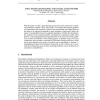Free Online Productivity Tools
i2Speak
i2Symbol
i2OCR
iTex2Img
iWeb2Print
iWeb2Shot
i2Type
iPdf2Split
iPdf2Merge
i2Bopomofo
i2Arabic
i2Style
i2Image
i2PDF
iLatex2Rtf
Sci2ools
96
Voted
ICCV
2009
IEEE
2009
IEEE
Matching as a non-cooperative game
With this paper we offer a game-theoretic perspective for the all-pervasive matching problem in computer vision. Specifically, we formulate the matching problem as a (population) non-cooperative game where the potential associations between the items to be matched correspond to (pure) strategies, while payoffs reflect the degree of compatibility between competing hypotheses. Within this formulation, the solutions of the matching problem correspond to evolutionary stable states (ESS's), a robust population-based generalization of the notion of a Nash equilibrium. In order to find ESS's of our matching game, we propose using a novel, fast evolutionary game dynamics motivated by Darwinian selection processes, which let the pure strategies play against each other until an equilibrium is reached. A distinguishing feature of the proposed framework is that it allows one to naturally deal with general many-to-many matching problems even in the presence of asymmetric compatibilities....
All-pervasive Matching Problem | Computer Vision | ICCV 2009 | Many-to-many Matching Problems | Matching Problems |
Related Content
| Added | 18 Feb 2011 |
| Updated | 18 Feb 2011 |
| Type | Journal |
| Year | 2009 |
| Where | ICCV |
| Authors | Andrea Albarelli, Samuel Rota Bulò, Andrea Torsello, Marcello Pelillo |
Comments (0)

